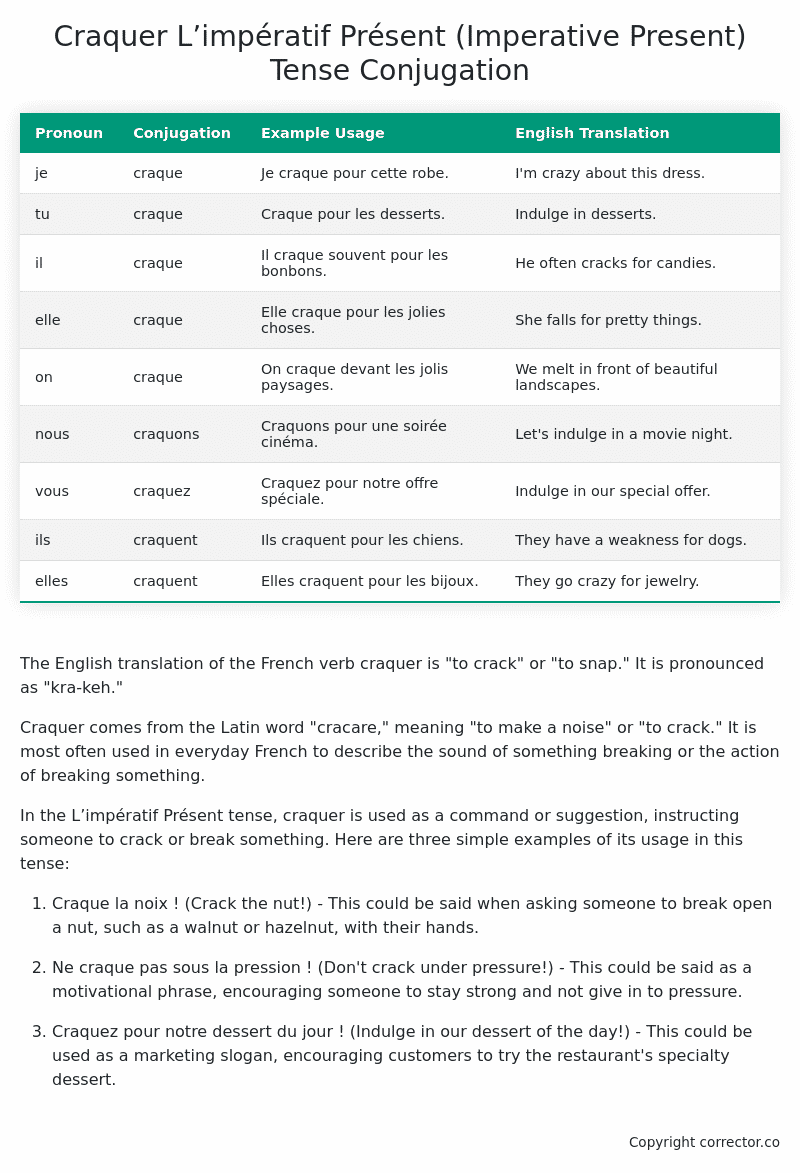L’impératif Présent (Imperative Present) Tense Conjugation of the French Verb craquer
Introduction to the verb craquer
The English translation of the French verb craquer is “to crack” or “to snap.” It is pronounced as “kra-keh.”
Craquer comes from the Latin word “cracare,” meaning “to make a noise” or “to crack.” It is most often used in everyday French to describe the sound of something breaking or the action of breaking something.
In the L’impératif Présent tense, craquer is used as a command or suggestion, instructing someone to crack or break something. Here are three simple examples of its usage in this tense:
-
Craque la noix ! (Crack the nut!) – This could be said when asking someone to break open a nut, such as a walnut or hazelnut, with their hands.
-
Ne craque pas sous la pression ! (Don’t crack under pressure!) – This could be said as a motivational phrase, encouraging someone to stay strong and not give in to pressure.
-
Craquez pour notre dessert du jour ! (Indulge in our dessert of the day!) – This could be used as a marketing slogan, encouraging customers to try the restaurant’s specialty dessert.
Table of the L’impératif Présent (Imperative Present) Tense Conjugation of craquer
| Pronoun | Conjugation | Example Usage | English Translation |
|---|---|---|---|
| je | craque | Je craque pour cette robe. | I’m crazy about this dress. |
| tu | craque | Craque pour les desserts. | Indulge in desserts. |
| il | craque | Il craque souvent pour les bonbons. | He often cracks for candies. |
| elle | craque | Elle craque pour les jolies choses. | She falls for pretty things. |
| on | craque | On craque devant les jolis paysages. | We melt in front of beautiful landscapes. |
| nous | craquons | Craquons pour une soirée cinéma. | Let’s indulge in a movie night. |
| vous | craquez | Craquez pour notre offre spéciale. | Indulge in our special offer. |
| ils | craquent | Ils craquent pour les chiens. | They have a weakness for dogs. |
| elles | craquent | Elles craquent pour les bijoux. | They go crazy for jewelry. |
Other Conjugations for Craquer.
Le Present (Present Tense) Conjugation of the French Verb craquer
Imparfait (Imperfect) Tense Conjugation of the French Verb craquer
Passé Simple (Simple Past) Tense Conjugation of the French Verb craquer
Passé Composé (Present Perfect) Tense Conjugation of the French Verb craquer
Futur Simple (Simple Future) Tense Conjugation of the French Verb craquer
Futur Proche (Near Future) Tense Conjugation of the French Verb craquer
Plus-que-parfait (Pluperfect) Tense Conjugation of the French Verb craquer
Passé Antérieur (Past Anterior) Tense Conjugation of the French Verb craquer
Futur Antérieur (Future Anterior) Tense Conjugation of the French Verb craquer
Subjonctif Présent (Subjunctive Present) Tense Conjugation of the French Verb craquer
Subjonctif Passé (Subjunctive Past) Tense Conjugation of the French Verb craquer
Subjonctif Imparfait (Subjunctive Imperfect) Tense Conjugation of the French Verb craquer
Subjonctif Plus-que-parfait (Subjunctive Pluperfect) Tense Conjugation of the French Verb craquer
Conditionnel Présent (Conditional Present) Tense Conjugation of the French Verb craquer
Conditionnel Passé (Conditional Past) Tense Conjugation of the French Verb craquer
L’impératif Présent (Imperative Present) Tense Conjugation of the French Verb craquer (this article)
L’infinitif Présent (Infinitive Present) Tense Conjugation of the French Verb craquer
Struggling with French verbs or the language in general? Why not use our free French Grammar Checker – no registration required!
Get a FREE Download Study Sheet of this Conjugation 🔥
Simply right click the image below, click “save image” and get your free reference for the craquer L’impératif Présent tense conjugation!

Craquer – About the French L’impératif Présent (Imperative Present) Tense
Usage
Giving commands
Making requests
Offering advice
Expressing desires
Conjugation Formation
Interactions with other tenses
Want More?
I hope you enjoyed this article on the verb craquer. Still in a learning mood? Check out another TOTALLY random French verb conjugation!


